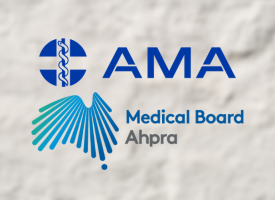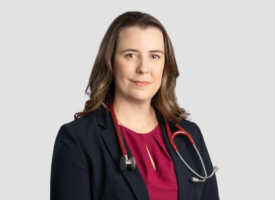Leave decisions to clinicians
Doctors at some Queensland public hospitals are reporting interference by senior executives in clinical decision-making, AMA Queensland President Dr Nick Yim has told 4BC. "We acknowledge there are challenges in our healthcare system at the moment, whether it be ramping, whether it be flow through the hospital, whether it’s access to aged care. But obviously we don't want that data manipulated...because if we have accurate data, we can see where we need to recruit and also where to retain."

Transcript: AMA Queensland President, Dr Nick Yim, 4BC, Mornings with Gary Hardgrave, Monday 29 July 2024
Subject: Executive interference in hospital decision-making; healthcare workforce shortages; AMA Queensland Surgical Wait List Roundtable
GARY HARDGRAVE: President of the Australian Medical Association Queensland, Dr Nick Yim, joins me now. Dr Yim, there's a real crisis, isn't there? There's a shortage of everybody in the health sector.
DR NICK YIM: Good morning Gary, and you're absolutely right. Our workforce is under strain. It's under pressure - doctors, nurses, allied health, the admin team, wardies etc - and you've hit the nail on the head. We do have challenges and with workforce being unwell and away from work, we can't be putting patients in beds that we're not servicing.
GARY HARDGRAVE: I saw it firsthand at QEII Hospital over the weekend. I felt for them. I think it's important for those of us who need access to health services to actually thank the people doing it. It's more than just a job for them. They're very dedicated to the care and concern of their patients. They don't want people in harm's way.
DR NICK YIM: You're right. And that's something where from a clinician’s perspective, we want to ensure that patient safety trumps everything. We know that there are markers, there are KPIs, and these are the stories that we're hearing from some of the public hospitals where there are elements of interference, where I guess they are prioritising some patients who are on the ramp, but might not be seriously unwell. There might be someone in the resuscitation bay who's having a heart attack, is unwell and they need to look after that patient first.
GARY HARDGRAVE: I see them queued up. I saw people, as I said, in and out of the hospital as I did in the emergency department, and there were people talking to people finding out what their symptoms were. They were doing the work that you want them to do. So surely it's got to be a clinical priority, not a PR priority when it comes to ramping, so to speak?
DR NICK YIM: Yeah, 100 per cent. Clinical decisions are really important. That ensures that patient safety remains number one. We acknowledge there are challenges in our healthcare system at the moment, whether it be ramping, whether it be flow through the hospital, whether it’s access to aged care. But obviously we don't want that data manipulated potentially, because we need to know that the data is there and is accurate, because if we have accurate data, we can actually help protect our workforce to see where we need to recruit and also where to retain.
Another big thing is, when we do have potential interference of clinical decision making, that puts a lot of pressure for that clinician. It can cause distress, because they want to put that patient number one.
GARY HARDGRAVE: What I want to see is a doctor fight for the patient. You know, the doctor's got to stand up for the patient. If they see something that's wrong with the patient, they're the ones that are going to say to the boss – I don't care if this is a career move or not. This person goes first.
DR NICK YIM: You're right. The doctors, we're always fighting for the patient because we know that patient, it could be a father, could be a mother, could be a grandparent, it could be someone's child. And it’s really important that we're putting that patient number one. We acknowledge that there's challenges, our workforce is under pressure. Our system is under strain. But at the end of the day, we're putting that patient number one.
GARY HARDGRAVE: So Dr Yim, when it comes to those in that whole sector, as you say, the wardies, the admin staff, the nursing staff, the paramedics - everybody's under pressure. This must be such a difficult environment to work in.
DR NICK YIM: It is really challenging. The key thing that we're trying to advocate for, our doctors, our members, and also the hospital staff, is we do not need additional pressures on top of the clinical pressures that we're dealing with. This is the message that we go, okay, we need this data. Yes, we acknowledge those challenges in our health systems and we need that data to be accurate. So we need to know where are the bed blocks, where is the hospital ramping, where is the paramedic ramping. And then we can ensure that we have enough workforce to be recruited to our system.
GARY HARDGRAVE: So how short are we? How many more doctors, how many more nurses? How many more wards? How many more admin staff? How many more people do we need in the business of care in Queensland?
DR NICK YIM: We know there's significant shortages and it's not just a Queensland issue. This issue is a worldwide issue. We know that there's going to be 10 million short by 2032 of health workforce. So we're not alone in this. But I think the key thing is what the doctors are looking for is ensure that we are protected. We don't need those additional pressures because at the end of the day, we don't need those additional psychological stresses. We need to ensure that our workplace is a safe environment to work in.
GARY HARDGRAVE: And of course, in Queensland's instance, people fly in, fly out. I've travelled to places like Roma with doctors who are on board because they're the visiting doctor going to wherever to do whatever. So we do have some extra challenges because it's a big state and our health services are so remote. So there's a lot of moving parts to this business.
DR NICK YIM: You’re 100 per cent right there. It's Queensland. We're a big state. And it's something where we acknowledge we've got elective surgery issues. So AMA Queensland, we are working with a group of doctors to develop strategies that we can present to the Queensland Government to help navigate this challenge of access to elective surgery, and that is only one small element of the healthcare system. And you're right, there are strategies in place. Currently, we are seeing doctors fly from Brisbane to Mount Isa. We are seeing doctors fly up north and out to Roma to assist with that workforce. And it's a great job that they're doing.
GARY HARDGRAVE: I certainly believe so, knowing some of these doctors who do this. And of course, it's not a case of one practises at a private hospital or one practises at a public hospital. They practise everywhere, wherever the patient is, wherever the need is, the doctors seem to be there now, you know, doctors, nurses. I've seen people who've worked at Greenslopes in the morning and are at PA in the afternoon and vice versa. I've seen these people doing this. I've met them, I've spoken to them. We've had workforce shortages through the COVID period that drove some of this. But you're saying 10 million worldwide, the competition for doctors, even from other countries, it must be intense.
DR NICK YIM: You're right. And that's something that we do need to compete on. It's something where we need to identify in our state, what are the actual numbers that we need? At the same time, we need to ensure that all the hospital health services do have a recruitment and retention plan because we need to ensure that we are keeping the doctors who are actually going to those regions. We need to keep those nurses, those allied health, the pharmacists, the wardies in those regions, because it is also quite challenging to recruit at this point of time.
GARY HARDGRAVE: So in other words, retention is always cheaper than recruitment. Anybody who hires people knows that. So if you've got such a shortage of these sorts of professionals, do they now set a price? Does the government just have to meet their price? I mean, I'm not suggesting everyone's about to down tools because I don't see you guys doing that. But in all seriousness, if we don't value those people who are working in all aspects of hospital healthcare, there's plenty of other people around the market that might well do that.
DR NICK YIM: And you're right, but it's not just the dollar. What we're hearing from a lot of our workforce is they are under pressure, they are burnt out, they're overworked. And at the end of the day, we need to ensure that workplace culture, that hospital and health service is safe for that workforce. And if the workforce is feeling safe, they're feeling supported, they will continue working there.
GARY HARDGRAVE: So less pressure from head office might be one aspect that government could act on, that might really costs them nothing else than other maybe some political PR pain. The point is here that we’ve got to manage the workforce in a way that works for the patient and works for the caregiver.
DR NICK YIM: Absolutely. And that’s something that AMA Queensland, we are really keen to work with the state government to ensure that we are keeping our doctors, and also recruiting our doctors to our state of Queensland.
GARY HARDGRAVE: Dr Nick Yim, he’s the President of AMA Queensland.
Contact: AMA Queensland Media: +61 419 735 641 media@amaq.com.au



